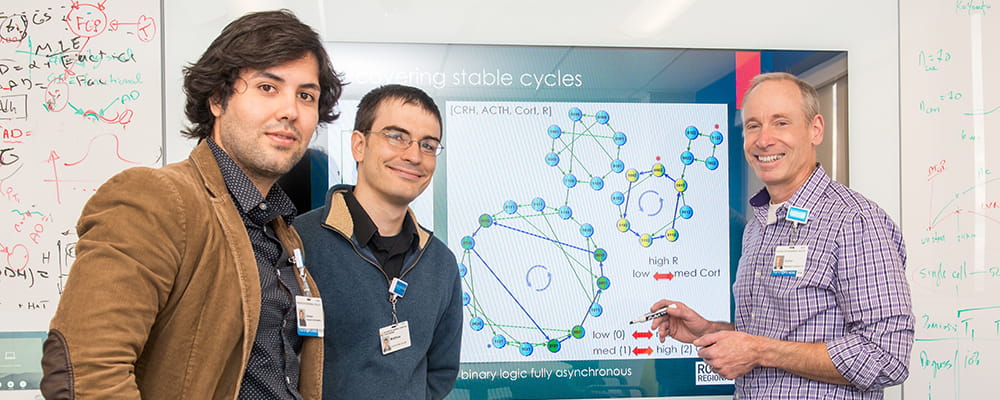Gordon Broderick, Ph.D. directs the research team at the Rochester General Hospital Center for Clinical Systems Biology. He is a leader in applying network and control theory approaches for identifying complex structure and regulatory dynamics in immune, nervous and endocrine systems for the development of therapeutic strategies.
The CCSB is focused on understanding immune dysfunction and autoimmunity from an integrated systems perspective.
We are investigating how subtle imbalances in the interplay between the immune system’s multiple components and its interactions with the endocrine and nervous systems may lead to complex disorders such as Gulf War Illness (GWI), Myalgic Encephalomyelitis/Chronic Fatigue Syndrome (ME/CFS), Cancer-related Fatigue (CRF), and others.
These illnesses and others like them don’t typically respond to a conventional one-piece-at-a-time approach. By considering the integration of the body’s systems functions (rather than viewing them in isolation), we are working to achieve new insights. We look at the immune, endocrine and nervous systems as part of an overarching, integrated whole. Towards this CCSB brings together intersecting and synergistic research initiatives in:
- Knowledge acquisition and representation
- Regulatory dynamics and control theory
- Network biology and complexity
- Behavioral systems biology
This comprehensive approach is at the heart of systems biology: an emerging science where context and interaction are key focal points.
Understanding Clinical Systems Biology
With our relatively newfound ability to perform large-scale surveys of the genomic and proteomic landscape, the principal challenge has shifted away from measurement toward interpretation of the data.
Our group has been developing and using analytical approaches rooted in information theory and formal dynamic systems theory to infer biological structure and function in these large data sets. More recently we have integrated data-driven techniques with natural language processing to more formally draw upon the research community’s collective knowledge.
In particular, we have been integrating these approaches to decipher the principles of operation of the immune system by mapping its internal communication network as well as its participation in neuro-endocrine signaling.
Our eventual goal is not only to tap into pathogenic immune conversations but also more importantly to re-direct these conversations with a limited number of well-chosen and well-timed pharmaceutical messages. This research is founded on the premise that for immune therapies to be both safe and effective the immune system must be considered as an integrated whole.
Read more about our work
- Elsevier Connect "How text mining is changing the way we tackle chronic disease", November 2017
- Science Magazine, July 2017

